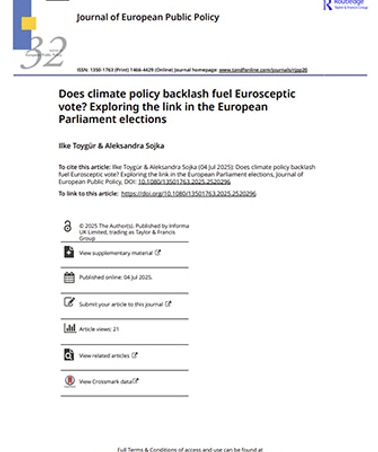- Home
- Publications
- Does Climate Policy Backlash Fuel Eurosceptic Vote? Exploring The Link In The European Parliament Elections
Does climate policy backlash fuel Eurosceptic vote? Exploring the link in the European Parliament elections
Does climate policy backlash fuel Eurosceptic vote? Exploring the link in the European Parliament elections

This academic paper examines how the European Green Deal— the EU’s flagship strategy for green economic transformation—has intersected with electoral politics ahead of the 2024 European Parliament elections. While the Green Deal has significant implications for sectors such as energy, transport, agriculture, and industry, it has also triggered resistance, most notably in the form of widespread farmers’ protests in early 2024. In response, EU leaders grew concerned that public backlash against climate policies could provoke Eurosceptic sentiment, prompting a visible deprioritization of green measures in the run-up to the elections.
Despite the attention this issue has received in political and media circles, there has been limited empirical evidence connecting climate policy scepticism to Eurosceptic voting. To address this gap, the authors analyse data from the European Election Studies (EES), demonstrating that in 2024, voters who prioritize economic growth over climate action were significantly more likely to vote for Eurosceptic parties—a marked shift from 2019. The paper concludes by discussing the implications of this trend for the future of the EU’s climate agenda.